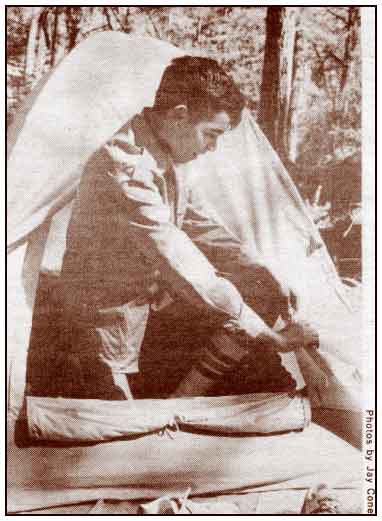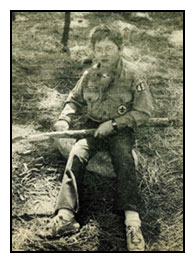 Scouts' Fire Hasn't Gone Out
Scouts' Fire Hasn't Gone Out Years ago, being a Boy Scout meant learning how to build a campfire with two matches or less, and then, once it was ablaze, singing songs around it. It meant listening to scoutmasters speak loftily of strong moral fiber and respect for the flag. And it meant dressing up like Indians.
meant listening to scoutmasters speak loftily of strong moral fiber and respect for the flag. And it meant dressing up like Indians.
All of this, back then, took place on smoky campouts and jamborees, from which the boys would return to mom smelling and looking like Franklin stoves.
But 70 years have passed since scouting first came to America. In all that time, what aspects have changed?
Very few. In fact, possibly none. That much was clear from the camporee held recently at Camp Frank Rand, a Boy Scout gathering place about 10 miles north of Nambe.
The camp is a nearly perfect place for scouts to spend a weekend. It sprawls across 2,500 remote acres studded with pinon and ponderosa pine. Its hills are littered with pottery shards, reminders of the late-14th-century 'Indians whose spirit the scouts often emulate.
And when the boys arrived on a Friday evening, there was an immediate test of their wisdom amidst the wilds: The weather was exceptionally dry, so water had to be rationed, and fire had to be handled with extreme care for fear of starting a blaze much too big to sing around.
Six troops containing 68 scouts showed up at the annual spring camporee. Five troops represented Santa Fe, and one came from Pojoaque. The scouts were divided into patrols which competed against each other on Saturday in a test of their skills in fire building, water boiling, first aid, compass direction-finding and knot-tying.
A number of first-place awards were won by the best patrols. But the other entrants didn't have to leave empty-handed — everybody got a ribbon, no matter how low they scored.
The Owl patrol from Troop 415 in Pojoaque took the first-place ("Presidential Award") with 629 out of a possible 700 points. The Eagle patrol of the same troop carried away the runner-up award. And the Eagle patrol of Troop 53 from Santa Fe earned the third-highest award.
Ben Gomez, scoutmaster of Troop 415, which produced the victors, has 25 boys in his troop. All but one has been with him since the days when Gomez was a Cub Scout leader. If his troop seems exemplary, it is because Gomez is selective about his scouts. "I don't take just anybody," he said.
Gomez typifies the scoutmaster of legend with his fervent patriotism and his sincere desire to pass his beliefs on to his scouts.
He explained that when he was a soldier in Vietnam, he watched on TV as demonstrators in Chicago burned and' mutilated the U.S. flag, and then raised a Vietnamese flag in its place.
"When I was in Vietnam, I saw disrespect for the flag, and it hurt me more than the war itself," he said. "No matter how wrong it is, it's still the best country in the, world. I want the importance of that flag to be known to each kid. I want these kids to show respect for the flag."
Ron Switzer, leader of Santa Fe Troop 53, has similar aims but a different approach. He is not as selective in his role as scoutmaster. "Our responsibility in the troop is providing a place for everybody who wants to be in scouting," he said.
"It tickles the hell out of me to go to a court of honor and see a boy advance and grow," he said, "because it indicates to me that he's one step closer to becoming a responsible young man. "It takes more than just a scoutmaster to have boys succeed in scouting," Switzer said.
"It takes sensitivity to recognize the needs of the scouts. And it takes a lot of hard work and personal dedication to meet the needs of the boys.
"The kids have to know that the adults are genuinely interested in their successes and failures. We have to cheer the kids when they're up and pick 'em up when they're down," he said.
Saturday night found the boys gathered around a campfire doing what they have always done: singing songs. They sang about having "that scoutin' spirit all over me . . . ," plus a few less wholesome tunes. They enacted age-old skits that made fun of their leaders. These were followed by equally age-old cheers with which the scouts made fun of themselves.
Yes, scouts still do the "cricket" cheer, executed with the fingernails, as well as the "watermelon" cheer. And there was an innovation, the New Mexican cheer: "Yucca! Yucca! Yucca!"
The evening turned solemn when three scouts dressed as Indians entered the campfire circle to the beat of a heavy tom-tom. One was a great chief, one a medicine man, and one a mere brave.
These Indians were representatives of a secret scouting organization known as the "Order of the Arrow." The Indians had come to "tap out" certain scouts and adult leaders for induction into the order. The chosen ones were scouts who had been judged to have lived up to the lofty ideals of scouting. They were voted into the order by their fellows.
After a long period of meditation and a secret and reputedly arduous test, they would become members of the order.
Expectation and envy glowed on the faces of the younger boys as the brave and medicine man toe-heeled their way through the troops. Occasionally, the tom-tom would abruptly stop its beat, and the medicine man would fiercely point at a boy or a leader.
The brave would lead the initiate to the chief, where he would be symbolically tapped on the shoulder three times. Then he would be roped together with the other candidates. The new recruits were then led away into the blackness of the forest, to the great wonderment of those who remained behind.
After a bitterly cold evening that left two inches of ice in the water jugs, the boys broke camp. By 9 o'clock Sunday morning, the camporee was over.
Most of the boys went home later that day with black fingernails, black faces and smoky clothes.
But if the boys were dirtier in appearance, the scoutmasters hoped — as they always have — that their minds were cleaner and their intentions more honorable than when the weekend began.
|
|


